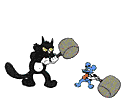Hi Wombat and djm... thanks for trying to point me in a direction. I guess I wasn't terribly clear about my question, so I'll try again. I realize that there are many different styles-- waulking songs, etc-- I was only giving one example of a type of music from each nation. I'm trying to figure out if there were some specific styles of music that come from Isle of Man, Cornwall, and Brittany... "names" that would be along the lines of Irish Sean nos, Welsh Penillion, and Scottish Puirt-a-beul.
Erg, that still sounds clear as mud...

See, I'm trying to write a brief paper that goes into Celtic cultural identity-- specifically how music helped preserve cultural identity-- and I just wanted to be able to give one type of music from each of the nations. But I can't seem to find anything very specific on those three nations.
Did that make any more sense? I'm having a brain blurp in the communication department at the moment...

